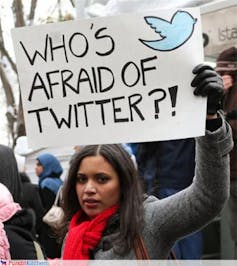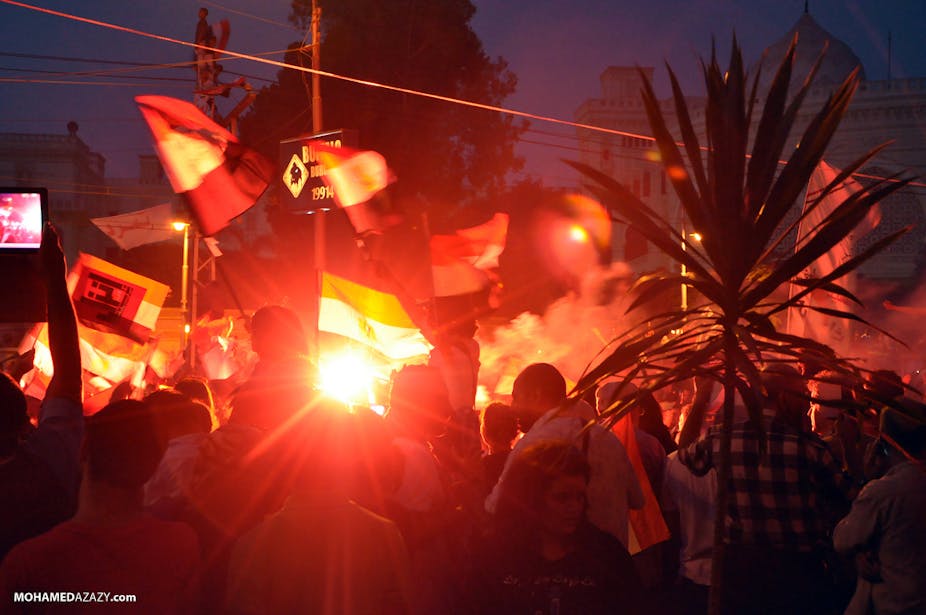These days all you need to be a revolutionary is a mobile phone and a grievance. Some see what is happening on the streets of Cairo as the ultimate expression of democracy - millions of people using social media to express their unhappiness with their government.
Others see it as the exact opposite - and forecast that Egypt’s 12-month experiment with democracy, after 30 years of dictatorship, will have been cut off in its infancy if the army carries out its threat to intervene in order to stop events spiralling out of control.
There appears very little sign of a co-ordinated opposition to the government of Mohammed Morsi: some are protesting about what they see as the prospect of the Islamisation of Egypt under a government dominated by Muslim Brotherhood, others at the price of oil and the poor performance of Egypt’s economy. But thanks to the connectivity the discontent appears to be building critical mass.
Social media and the Arab Spring
In 2011 the “social media revolution” meme, emphasising the vital role of sites such as Facebook and Twitter in the co-ordination of mass demonstrations that challenge and undermine the authority of non-democratic regimes, dominated much of the media coverage of the wave of popular uprisings in North Africa and the Middle East that would later be referred to as the “Arab Spring”.
Inevitably, events in countries such as Egypt and Tunisia were used as evidence in support of both optimistic and dystopian views of online activism, the former represented by Clay Shirky’s optimistic notion of “organising without organisations” and the latter by Evgeny Morozov’s critique of cyber-utopianism that details the ways in which the use of social media by activists may leave them increasingly vulnerable to government surveillance.
Two years on from the Arab Spring the “technology as liberator” frame was used by the mainstream media in its coverage of the protests in Brazil and Turkey, both of which swelled out of relatively insignificant grievances. Both Facebook and Twitter appear to have played a vital role in the coordination of protests in these countries that threaten to destabilise their respective governments.
It’s appropriate then, to explore how social media was involved in “spreading revolution” during the Arab Spring.
Leaderless uprisings
Spontaneous leaderless uprisings do not evolve from the act of sharing content on Facebook. Recent research by Phillip Howard and Muzammil Hussein pointed to a complex model of protest mobilisation. This involved the integration of new media technologies into the toolkit of both local activists and exiled or diasporic activists. It enabled the coming together of these groups through the identification of shared grievances and the use of digital media to organise street protests (“ignition events”) with the intention of broadening the base of the movement and attracting the attention of the international media.

In his study Tweets and the Streets, Paolo Gerbaudo referred to an emerging style of “soft leadership” in which organisation and communication are heavily interlinked. This way, influential “tweeps” and Facebook administrators become de-facto leaders of protest movements. Nevertheless, “soft leaders” often may not wish to take credit for the co-ordination of these events, in order to preserve their anonymity and avoid possible sanctions from the state. There may be a benefit in cultivating a myth of “leaderless resistance” in relation to the protests seen recently in Istanbul and several Brazilian cities including Rio de Janeiro.
Secondly, the physical occupation of space remains the most effective way of drawing attention towards these movements, as demonstrated by the extensive coverage of the Tahrir Square demonstrations over 18 consecutive days in January 2011 by news organisations such as the BBC.
Furthermore, a study found that more of the participants interviewed in the square had heard about the protests via a friend or acquaintance rather than on social media. However, early participants, many of whom were activists, used sites such as Facebook and Twitter extensively. Nearly half of the interviewees had also created and shared content documenting the demonstrations (for more see Tufekci and Wilson, 2012). It may appear self-evident but it is worth repeating: social media did not in and of itself bring down the Egyptian and Tunisian governments.
That is not to say that digital media did not make a significant contribution towards regime change in these countries. Activists used Facebook and Twitter not only to co-ordinate these street protests but also to draw the attention of television news networks and international audiences towards these “ignition events”.
Nevertheless, cyber sceptics such as Morozov may have a point in their refusal to buy into the seemingly utopian view of social media as the cause of these popular uprisings. As I have argued in relation to the use of social media to arrange street riots in Belfast, these events are not reliant upon one particular site and may be organised on a variety of platforms or by using different technologies.
The continued instability in Egypt under Morsi is testament to the fact that it may be hard to satisfy the interests of the diverse groups that come together under a “pro-democracy” banner. There is no single recipe for delivering social change in non-democratic regimes and seemingly transportable social media strategies may prove more or less effective depending on the context in which they are used.
Hence, many countries affected by the Arab Spring, such as Bahrain and Syria, have not experienced a similar transition to that seen in Egypt and Tunisia in January 2011 (with particularly tragic consequences for Syria).
Media framing of “Twitter Revolutions” presents a simplistic and misleading view of contemporary protest movements. The focus should instead be on the socio-political context in which specific technologies are used rather than overly optimistic accounts that make generalised assumptions about the internet as a force for liberation.

